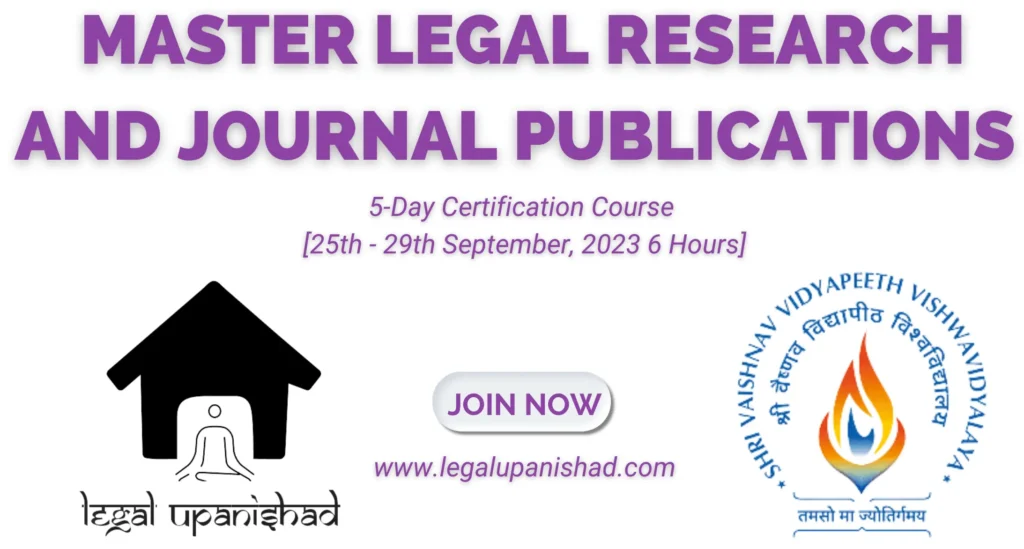5-Day Certification Course [Duration: 25th – 29th September 2023, 6 Hours]
Course Coordinator: Ms. Mansi Trivedi and Legal Upanishad
Course Objectives
- To introduce students to the different methods and techniques of legal research.
- To develop students’ skills in identifying and formulating legal research problems.
- To teach students how to locate, evaluate, and synthesise legal sources.
- To train students to conduct research on various legal databases and tools.
- To prepare students to write legal research papers and articles.
- To guide students in publishing their research in law journals in India.


Course Outline/Modules
- Module 1: Introduction to Legal Research
- Module 2: Research Design and Data Collection
- Module 3: Technology in Legal Research
- Module 4: IPR in Research
- Module 5: Panel Discussion
DAY- 1 Module 1: Introduction to Legal Research
[Dr. Shambhavi Sinha, Assistant Professor, Bennett University, Noida]
Day 1 – Duration: 1.5 Hours
- Understanding the importance of research and legal research
- Recent trends in research including interdisciplinary and multi-disciplinary approaches.
- Steps in research
- Research for publications
- Selecting appropriate research methods.
- Choosing the right topic for research
Module Objective
In Module 1 of the course “Mastering Legal Research & Journal Publication in India,” students will learn about the importance of research and legal research. They will gain an understanding of recent trends in research, including the interdisciplinary and multidisciplinary approach. The module will also cover the steps involved in conducting research, providing students with a comprehensive understanding of the research process. Additionally, students will learn about research for publications, equipping them with the necessary knowledge and skills to effectively contribute to the legal literature.
DAY 2- Module 2: Research Design and Data Collection
[Dr. Apoorva Dixit, Assistant Professor, Jagran Lakecity University, Bhopal]
Day 2 – Duration: 1 Hour
- Developing research questions and objectives
- How to Structure the Legal Research Paper
- Formulating research hypotheses
- Developing research proposals
- Identifying relevant legal sources
- Analyzing legal cases, statutes, and regulations
Module Objective
In Module 2, “Research Design and Data Collection”, students will learn research design, data collection, research questions, objectives, hypotheses formulation, appropriate research methods, research proposals, legal sources identification, and analysis of legal cases, statutes, and regulations. This module equips students with the skills to plan, present, and critically examine legal materials, ensuring their research aligns with their goals. The module also provides insights into selecting appropriate methods and analysing legal cases, statutes, and regulations for effective research.


DAY 3- Module 3: Technology in Legal Research
[Ms. Smriti Panjwani, Assistant Professor, Jagran Lakecity University, Bhopal]
Day 3 – Duration: 1 Hour
- Objectives and Analysis
- Research Tools used
- Introduction to legal research software and platforms
- Benefits of Technology in Research
- Demonstration of popular legal research tools and their features.
Module Objective
In Module 3, “Technology in Legal Research,” students will explore the role of technology in legal research. They will discuss objectives and analysis and learn about common research tools. They will understand legal research software and platforms, which can improve efficiency and effectiveness. The module emphasizes the benefits of technology in research, such as streamlining processes, improving accuracy, and expanding access to legal information. Popular legal research tools will be demonstrated, providing practical insights and enabling students to familiarize themselves with their features and functionalities.
DAY 4- Module 4: IPR in Research
[Dr Deevanshu Shrivastava, HOD of Law, Jagran Lakecity University, Bhopal]
Day 4 – Duration: 1 Hour
- Basic Concept of Intellectual Property Rights (IPR)
- IT and IPR
- Types of IPR Applicable to the Internet
- Trademark vs. Domain Names
- Patent and other rights and Internet
- Plagiarism
- Plagiarism through the Internet
Module Objective
In Module 4, “IPR in Research,” students will explore Intellectual Property Rights (IPR) in research, focusing on the intersection of IT and IPR. They will learn about the legal implications, potential conflicts between trademarks and domain names, and the relationship between patents and other internet-related rights. The module also addresses plagiarism, its ethical implications, and its consequences in the research community, focusing on online content duplication and challenges. Overall, this module provides a comprehensive understanding of IPR in research and journal publication in India.
DAY 5- Panel Discussion and Doubt clearing session
Day 5 – Duration: 1.5 Hours
Objective
The panel discussion will bring together experts in the field of legal research and journal publications. The discussion will revolve around relevant topics related to legal research methodologies, challenges faced in journal publications, emerging trends in the field, and practical tips for success. This session provides an opportunity for participants to seek clarification on specific concepts, discuss challenges they encountered during the course, and receive guidance from the instructors and course coordinator.
Mastering Legal Research and Journals: Unlock Your Potential and Achieve Success!
Take your legal research skills to the next level with our Mastering Legal Research and Journals program. Register today to unlock essential tools and knowledge for success. With expert guidance, learn how to approach legal research confidently, navigate complex documents, and stay updated with industry trends.
Whether you’re a seasoned professional or just starting out, this program is perfect for skill enhancement. The original price is Rs.999, but you can enroll now for only Rs.699 after a 30% discount. Sign up now and become the legal research expert you were meant to be!
Payment Method
Scanning the QR Code Provided Below | Through UPI ID: tushar.eicher@okaxis


The QR Code can be scanned through any payment app like Google Pay, Paytm, PhonePe etc.
For Account Transfer:
Name – Tushar Sharma
Bank name – Bank of Baroda
Account No. – 45648100008987
IFSC – BARB0BADlXX

